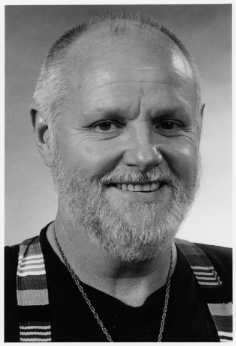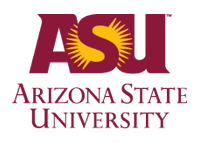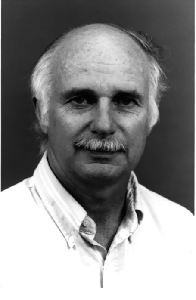 |

Teachers of the Month Lynn Bellamy Barry McNeill |
 |
 |

Teachers of the Month Lynn Bellamy Barry McNeill |
 |
These two instructors work as a team when teaching undergraduate classes at the university. They are regarded by colleagues and students as innovative and dedicated to their fields. Associate Civil Engineering professor Karl Smith said, "Lynn and Barry are the most dedicated, tireless, creative, risk-taking engineering professors I know." |
We view ourselves as a small team of two professors who are actively involved in changing the way we and our colleagues do what we do or in changing the way we do business. Our approach and/or philosophy regarding the teaching enterprise and our agenda for continued teaching development and innovation is presented below in terms of: (1) what we would like to share with all students, our colleagues, and our community, and (2) where our efforts are current ly focused.
We look forward to the opportunity for us to share the results of our work and interest with a larger community; i.e., beyond the science, engineering, business, and technical communities. It would also allow us to increase our contribution to, and partic ipation in, the development of an interdependent community or system at Arizona State University; i.e., a technologically literate, cohesive community which can enhance the opportunities for both individual and institutional success.
If you would like to view this information on the World Wide Web, it can be accessed at http://www.public.asu.edu/~ece100 or http://ece.eas.asu.edu/ece100. The World Wide Web site includes all of the information availabl e for the students taking this course, for the team of 10 instructors teaching this course at ASU, for the instructors at the Community Colleges in Arizona who will teach this course next year, and for our colleagues in the United States and other countri es who are using parts of this material in their courses. You can also access the Electronic Forum for this course which is used to solicit suggestions for improving the course from students and colleagues.
2Armstrong, Thomas, Multiple Intelligences in the Classroom, 1994, Association for Supervision and Curriculum Development, Alexandria, Virginia 22314
3Barr, Robert B. and John Tagg, "From Teaching to Learning - A New Paradigm for Undergraduate Education", Change, November/December, 1985
4Moulakis, Athanasios, Beyond Utility: Liberal Education for a Technological Age, 1994, University of Missouri Press, Columbia, Missouri 65201
Note: This represents only a small portion of these professors' work. Please see their web pages for more information.
McNeill, B. "Enter the Attic of the Mind: Higher Order Thinking Skills". University Development Day, 1996. Texas A & M University, Kingsville, January 1996.
Bellamy, L.. and J. Bailey and D. Lanaanen and B. McNeill and W. Moor and R. Roedel and 1. Zweibel. "An Introduction to Engineering Design: Teaching the Engineering Process through Teaming and the Continuous Improvement Philosophy". 1995 Frontiers in Education Conference; Atlanta. November 1995.
McNeill, B. "ECE 100 Introduction to Engineering Design". A Seminar presented to the Maricopa Community College Quality in Education Group. September 1995.
McNeill, B. "ECE 100 Introduction to Engineering Design". Maricopa Community Collage Awareness Workshop. September 1995.
McNeill, B. "ECE 100 Introduction to Engineering Design". Urban Council on Systemic Chance. September 1995.
Bellamy, L. "Eliminate Lectures?", 81st Annual Meeting of the Association of American Colleges and Universities, San Francisco, January 1995.
Bellamy, L. and McNeill, B. "Curriculum (Course) Development, Design, Specification and Assessment"; "Active Learning in the Engineering Classroom"; "Team Training" (for Deans, Department Chairs, Faculty and Staff, all Colleges): Workshops, Texas A&M University, College Station, December 13 - 17,1994
Bellamy, L and B. McNeill. "Active Learning in the Engineering Classroom" Workshop. BMES Annual Meeting, Tempe, Arizona. October 1994
Bellamy, L., et al. "Active Learning, Teams and Team Training, Quality Management Principles in the Engineering Classroom". Proceedings of the 1994 American Society for Engineering Education Annual Conference; Edmonton, Alberta, CN; June 1994.
Bellamy, L. "Curriculum (Course) Development, Design, Specification and Assessment"; "Active Learning in the Engineering Classroom"; "Team Training" (for Deans and Department Chairs, Engineering Faculty) Foundation Coalition Workshop, Rose Hulman Institute of Technology, June 1994
Bellamy, L. "Curriculum (Course) Development, Design, Specification and Assessment"; "Active Learning in the Engineering Classroom"; "Team Training" (for Deans, Department Chairs, and Engineering Faculty): Foundation Coalition Workshops, Universi ty of South Alabama, Mobile, May 23 - 26,1994.
Bellamy, L. "Curriculum (Course) Development, Design, Specification and Assessment"; "Active Learning in the Engineering Classroom"; "Team Training" (for Deans, Department Chairs, and Engineering Faculty) Foundation Coalition Workshops, Texas A&M University, Kingsville, March 29 April 6,1994.
Bellamy, L. "Curriculum (Course) Development, Design, Specification and Assessment"; "Active Learning in the Engineering Classroom"; "Team Training" (for Deans, Department Chairs and Engineering Faculty): Foundation Coalition Workshops, Universit y of Alabama, March 16 - 23, 1994.
Bellamy, L. and D. L. Evans and Darwyn Linder and B. W. McNeill and
G. Raupp. "Workshop on Team Building".1993 Annual Conference, American
Society for Engineering Education, Edmonton, Urbana/Champaign, IL. June
1993.
McNeill, B. "ECE 100 Introduction to Engineering Design". A Seminar presented to the Mechanical Engineering Faculty. September 1995.
McNeill, B. "ECE 100 Introduction to Engineering Design". A Seminar presented to the Construction Engineering Faculty. September 1995.
McNeill, B. "ECE 100 Introduction to Engineering Design". A Seminar presented to the Chemical Engineering Faculty. August 1995.
Bellamy, L. "The Role of Engineering in a Liberal Education". Faculty Emeritus Club, March 1995.
Bellamy, L. "Active Learning in the Technical or Engineering Classroom". Campus Experience Program, March 28,1995.
Bellamy, L. "Active Learning in the Technical or Engineering Classroom", Campus Experience Program, October 28, 1994.
Bellamy, L. NSF/ Texas A&M: New Engineering Science Core at Arizona State University, presented to the Civil Engineering Department at ASU at the request of the Department Chair, October 22 and October 29, 1994
Bellamy, L. "Cooperative Learning at ASU", Campus Experience Program,
October 14, 1994.
McNeill, B. and L. Bellamy. Engineering Core Workbook for Active Learning Assessment & Team Training Fourth Edition, CAPCO 1995. Also available on the World Wide Web: http://www.public.asu.edu/~ece100
Bellamy, L. and G. Raupp. NSF / Texas A&M: New Engineering Science Core at Arizona State University. ERIC Clearinghouse, 1995. [Originally published by ASU 1994]
Bellamy, L. and B. McNeill. Active Learning in the Engineering Classroom. ERIC Clearinghouse,1995. [Originally published by ASU 1994]
McNeill, B. and L. Bellamy. Curriculum Development Design. Specification and Assessment. ERIC Clearinghouse,1995. [Originally published by ASU 1994]
Bellamy, L. and D.L. Evans and D.E. Linder and B. McNeill, and G. Raupp. Teams in Engineering Education. ERIC Clearinghouse,1995. [Originally published by ASU 1993]
Bellamy, L. A Collage of Information on Change. Arizona State University, 1994
Last Update: August 15, 1997
Page Contact: Kelly.Truitt@asu.edu
URL--http://www.asu.edu/upfd/teachmo/bel-mc.html